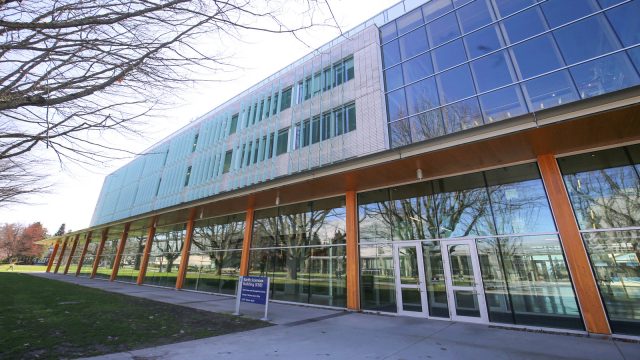Atmospheric Science is the study of weather and climate. This highly interdisciplinary specialization focuses on meteorological fields including air quality, environment, climate change, weather monitoring & instrumentation, and consulting.
Why this program?
- The program offers strong connections to Environment Canada, and is housed at one of the world’s top-ranked universities in environmental sciences.
- Small class sizes in upper-year courses ensure that students get individual attention.
- Project-based learning emphasizes hands-on labs in biometeorology, urban meteorology, weather instruments, and atmospheric chemistry.
Program information
Send details- Campus: Vancouver
- Faculty: Faculty of Science
- Degree: Bachelor of Science
- Length 4 yrs
-
Co-op
Yes
You can combine your studies with full-time, paid work at top local and international organizations.
-
Honours
No
You can study intense specialization in a single field.
Atmospheric Science is the study of weather and climate. The undergraduate specialization is highly interdisciplinary with a focus on numerical problem solving/computation, the atmospheric boundary layer, and physical climatology.
Courses focus on meteorological fields including air quality, environment, climate change, weather monitoring and instrumentation, and consulting. The program has deemphasized traditional weather forecasting to reflect changing industry demands.
The program’s strong emphasis on computation equips students with the computation and mathematical knowledge for data analysis and atmospheric modelling. The program’s interdisciplinary nature emphasis the integration of meteorological knowledge with issues such as air quality, environmental sustainability, and renewable energy.
Atmospheric Science has integrated modern pedagogical practices into its curriculum such as flipped classrooms, just-in-time-teaching (JiTT) and two-phase exams.
Campus features
Undergraduates in this specialization make use of many modern facilities. The Earth Sciences Building includes a weather-instrument platform for research and teaching, modern labs for oceanographic research, wet labs, and two PC classrooms. There are extensive hands-on labs and equipment to introduce students to biometeorology, micrometeorology, urban meteorology, weather instruments (including LIDAR), and atmospheric chemistry. Data from second climate station at Totem field is used regularly.
The Pacific Museum of the Earth includes a green screen that students use for mock TV weather briefings, a “weather lane” of displays including a tornado machine, and an OmniGlobe for display of weather and other geophysical data.
Students use Mechanical Engineering’s Aerodynamics Laboratory in the specialization’s instruments course, and the Engineering Design Center enables creative instrument development.
The Atmospheric Science faculty also owns cluster computers for numerical weather and climate simulations.
Life at UBC's Vancouver campus
Built in 2012 to LEED Gold construction standards, the Earth Sciences building is home to the Department of Earth, Ocean, and Atmospheric Sciences. It houses the department’s cluster computers for numerical weather and climate simulations, weather-instrument platform for research and teaching, modern labs for oceanographic research, wet labs, and two computer labs.
Find out moreYour future
A BSc in Atmospheric Sciences qualifies students for work in air quality meteorology or environmental consulting, as well as for further study in graduate programs.
Many graduates are employed as weather forecasters for government weather services, with an increasing number finding employment with weather-forecast companies that tailor forecast for agriculture, aviation, and air quality.
Program graduates
- Operational meteorologist, Environment Canada
- Weather specialist, BC Public Service
- Consultant, Environmental Resources Management
- Air quality specialist, WSP in Canada
Program requirements
English-language requirements
English is the language of instruction at UBC. All prospective students must demonstrate English-language competency prior to admission. There are numerous ways to meet the English Language Admission Standard.
General admission requirements
IB Diploma Programme
- Completed IB Diploma, including at least three Higher Level courses.
IB Certificate Courses
- IB Certificate courses (Standard and Higher Level) may be used in an admissions average if you are graduating from a recognized high school curriculum that can be used as your basis of admission.
- IB Math Applications and Interpretations SL, or IB Math Studies, do not satisfy the math requirement for admission to UBC’s science-based programs, the Faculty of Management, the UBC Sauder School of Business, or the Vancouver School of Economics.
Degree-specific requirements: Science
- IB Math Analysis and Approaches SL or HL, or IB Math Applications and Interpretations HL (IB Math Applications and Interpretations SL, or IB Math Studies, are not acceptable)
- One of IB Biology, IB Chemistry, or IB Physics
- Grade 11 or equivalent Chemistry, and
- Grade 11 or equivalent Physics (may be waived with grades of 5 in IB Chemistry and in your IB Mathematics course)
Note: Grade 11 Chemistry and Physics requirements listed are only relevant to students who are not completing the equivalent IB Diploma Chemistry and/or Physics courses.
For students studying outside of Canada, some examples of courses that may be accepted as Grade 11 equivalents are junior-level courses for American students, and IGCSE and O Level for those following British-patterned curricula.
Related courses
The following subject categories are particularly relevant for this degree. Consider taking courses in these areas in your junior year and senior year.
- Language Arts
- Mathematics and Computation
- Sciences
